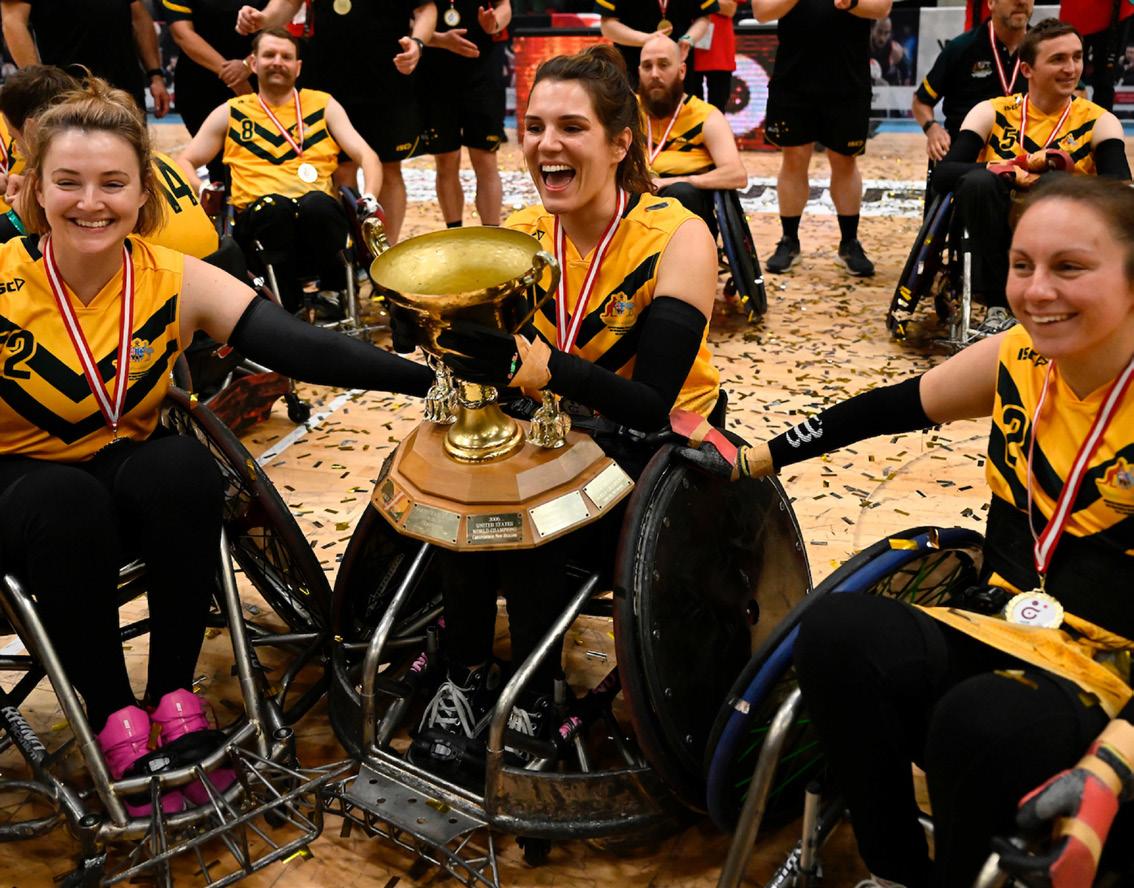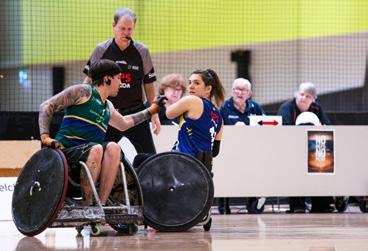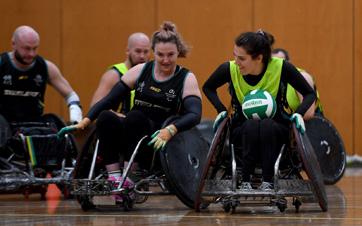
8 minute read
A champion of change
An Australian wheelchair basketball and rugby player, Ella Sabljak is also a member of the World Anti-Doping Agency’s Athlete Council and Sport Integrity Australia’s Athlete Advisory Group. In her own words, Ella talks about the role sport plays in her life, the challenges she’s faced and what drives her to push for change.
It wasn’t until I was 15 that I re-discovered sport. That time was pivotal for me in discovering who I was and accepting my disability.
It’s more than just sport for me. It’s about pushing my boundaries, reaching my full potential, as well as acceptance and inclusion.
Para-sport plays a huge part in society by offering people with a disability the opportunity and option to play sport, which in turn breaks down the social stigmas around disability. In high performance sport we are still seeing athletes with a disability being celebrated for ‘getting out there and giving it a go’. Athletes with a disability put in as many hours (as our able-bodies counterparts) to work on our craft with limited financial support, access to facilities, coaching and still manage to come out on top despite all that is thrown at us.
Para-sports encourage individuals to step out of their comfort zones and embrace challenges, showcasing what can be achieved.
Not only does Para-sport allow people with a disability to play sport, it also opens up the doors to have significant social impact on society.
When we see athletes competing at the Paralympic Games, the social impact of having a person with a disability in the public eye allows us to break down those misconceptions of disability and discrimination and fosters conversation about accessibility and creating an inclusive society.
Ultimately, the saying 'you can’t be what you can’t see' highlights the importance of representation and awareness in promoting inclusivity.
Ella's Achievements
Under 25 – World Wheelchair Basketball Championships
2011 – Silver Medal 2015 – Silver Medal
Australian Gliders
2021 – Tokyo Paralympic Games 9th place
Commonwealth Games – 3x3 Wheelchair Basketball
2022 – Silver Medal
Wheelchair Rugby
2022 – Gold at the World Championships
2023 – Gold at the Paris World Cup
Athlete Representative
World Anti-Doping Agency Athlete Council
Sport Integrity
Australia’s Athlete Advisory Group
Paralympics Australia’s Athlete Commission

Representing Australia
Competing for Australia in both wheelchair basketball and rugby is a massive privilege and I will never take my opportunities for granted. Sport has allowed me to create lifelong friendships, challenge myself into doing things which I never thought was possible and create a life where I am living to my full potential.
In 2011, my journey representing Australia began at the Under 25 Women’s World Wheelchair Basketball Championships in Canada. Following our silver medal, I earned a spot on the senior Australian team, known as the ‘Gliders’, and competed in the Osaka Cup in Japan in January 2013.
It wasn’t until 2018 that we competed in the World Wheelchair Basketball Championships in Hamburg, marking my first major Australian tournament outside of junior world championships. In 2019, we secured qualification for the 2020 Tokyo Paralympic Games, but the pandemic forced an unexpected detour. These Paralympic Games were unlike any experience I had encountered before, no crowds and family, leaving only our team and the sport we love.
I transitioned to training for the Commonwealth Games, which featured 3x3 wheelchair basketball for the first time in Birmingham. These games marked my final competition representing Australia in wheelchair basketball, winning a silver medal.
In 2022, I was presented with the opportunity to try Wheelchair Rugby, and I quickly earned a place on the Australian Steelers for the World Championship team. We went on to win a gold medal at the 2022 Wheelchair Rugby World Championships in Vejle, Denmark. Shifting from basketball to rugby was a seamless transition in terms of chair skills and movement, both with and without the ball. However, I had to adapt and learn new strategies and gameplay.

Currently, I am a full-time wheelchair rugby player with my sights set on the Paris 2024 Paralympic Games with the Australian Steelers.
Expansion of Para-sport
Throughout my career, I’ve witnessed a substantial expansion of Para-sport, not only in terms of representation but also in funding. A significant milestone was reached at the 2021 Tokyo Paralympic Games, thanks to an extensive campaign led by Chloe Dalton (thefemaleathleteproject). This campaign resulted in Paralympic medallists receiving the same financial rewards as their Olympic medallist counterparts. In the past year, our government has also granted equal funding to both Olympic and Paralympic sports, a significant moment for our Paralympic movement here in Australia.
Beyond funding, we’ve seen a growth of multi-class sporting events in schools, enabling children with disabilities to participate in sports alongside their peers. Additionally, Para-sport is now accessible to a broader audience through television broadcasts. For instance, the Paralympic Games will be televised on Channel 9, while the PowerRoos (powerchair Soccer) can be watched on Channel 10. Wheelchair Rugby and Wheelchair AFL Nationals are available on Kayo, and Swimming and Athletics can be watched on Channel 9. By making Para-sport more visible to the public, we increase awareness and bust misconceptions surrounding disability.

Finding My Voice
Growing up with a disability, often people would speak on my behalf – whether it be related to schooling, hospital appointments or socially. I never learned how to use my voice to express what I needed because it was done for me. As I grew up, I noticed people asking questions that were for me, but directed to whoever else I was with. It feels as though you don’t exist and can’t speak for yourself – because of how society views disability.
When I started to become more involved in sports, I discovered my voice. I began speaking up for myself, calling out behaviours that would never be acceptable in the ‘real world’ outside of high-performance sport, helping other people discover their voices and how to use it. I’ve always fought for the underdog. This is what drives me on athlete councils, for all para-athletes to have their voices heard and listened to on matters that directly affect us. From a Paralympian’s perspective, we’re always fighting for a seat at the table. I want to be a champion of change, so no one is left behind.
My work with the World Anti-Doping Agency and Sport Integrity Australia has been a steep learning curve, especially in all matters anti-doping and, recently, in classification and Intentional misrepresentation. Having the athlete voice is crucial in these organisations as it informs everyone about what is actually happening within the athlete world and how we can best represent them with the athlete safety, wellbeing and integrity being at the forefront of every decision we make.
Integrity In Sport
Integrity plays such a crucial role in all sports, including Para-sports. It is vital that competition is fair and athletes have an equal opportunity to succeed. This is where in Para-sports specifically classification plays an enormous role in keeping sport fair.
Classification ensures a level playing field where athletes are classified fairly based on their impairments, preventing any manipulation of the system. This is essential for the credibility of Para-sport and for maintaining the trust of both athletes and the public. I would stress that classification plays a larger role in Para-sport than anti-doping does.
Classification is an incredibly flawed system, it’s a system put in place to protect the integrity of Paralympic sports and athletes, however because we’re dealing with medical information, internal and external pressures to perform, selection, this brings in the ability to manipulate the system to the athlete's advantage. You’re often placed in a sticky situation if you’re questioning someone’s disability relating to classification because you don’t want to call someone a cheat or a liar and no two disabilities are the same … but where do we go if we suspect someone of cheating?

In my experience, I have only seen and heard of a couple of occasions where other people have speculated that another athlete is cheating the system but that’s all it has been, speculation.
Other Challenges
One of the challenges I’ve encountered in Para-sport and, in my own opinion, particularly, is the relatively faster ascent to the top.
The Paralympic pathway appears to be less competitive for both athletes and administrators compared to the Olympic pathway. It’s not uncommon to see individuals without disabilities, such as coaches, domestic classifiers, managers and administrators, transitioning into Para-sport after experiencing limited success in their non-disabled sport pursuits.
This sometimes creates the perception that involvement in Para-sport is a secondary choice rather than an equal and valuable one to non-disabled sports. Consequently, it can lead to a lack of genuine support and engagement, with some individuals getting involved primarily for un-altruistic reasons. Athletes with disabilities often find their voices ignored and when we do speak out, it may be suggested that we express gratitude for the opportunities provided rather than being heard. This issue within Para-sport is multi-faceted, with its roots in funding disparities and the need for equal opportunities to attract and compensate the best person for the job.










